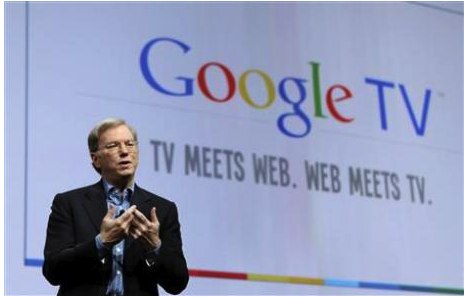Tech's TV takeover: Why Hollywood should embrace Silicon Valley, not fight it

One of the buzz topics this week has been Google TV, a product that's not even available to consumers yet but already has news outlets issuing the warning call that technology is on the verge of doing to TV what it's already done to the music, news and movie industries. 
Some might say that technology has ruined those other industries while others might say that the influences of tech have made them better. In terms of TV, it's hard to say what will happen. But when I see "quality" television programming like The Bachelor (How many times can someone say "I Love You" for 10 different camera shots and still sound sincere about it?), I certainly hope Google TV can make the programming better.
Actually, making television better isn't the goal for Google. It doesn't own Hollywood studios or employ actors. What Google is trying to do is make the television experience better for the viewers, to give them a place where they can simultaneously search traditional TV, as well as online video sites, from the big screen in the living room.
Also: Google, Apple, Netflix are among those trying to shape 21st Century TV
It makes sense that the content owners, the networks, the Hollywood distributors, the advertisers and anyone else who has their fingers in the television money pot would be a little nervous about Google's plan, especially since the search-and-advertising giant from Silicon Valley has said very little about its plans for monetizing Google TV.
Clearly, advertising - at some point - becomes an important piece of the business puzzle.
But to hear the Wall Street Journal and Los Angeles Times tell the story, you'd think that big bad Silicon Valley is done chewing on the music and news media industries and now has its sights set on taking over television.
But let's take another look, this time wearing the glass-half-full glasses. The television industry is in a unique situation because, hopefully, it saw first-hand what happened to those other industries when they resisted the wave of technology that was headed straight at them. They held their breath, put up their fists and hoped that the technology influence would pass them by without leaving them bruised and scarred.
No such luck. Technology - from software to hardware to the Internet itself - took the music and news media industries by storm. (And, no, the tech industry isn't done with them yet.)
The moral of the story: technology will come in and poach its way into your industry. (In fact, that's already happening.) You can fight it if you'd like, but take a lesson from your buddies in the music and news game. Fighting tech is a losing battle.
Instead, the television industry should take this early opportunity to embrace technology, to walk hand-in-hand with Google to enhance the experiences for viewers so that the television programming offers more value for the viewer and the advertiser. We're early in the game, so early that Google still says (if you believe them) that they don't have an advertising plan yet.
If that's true, the TV industry needs to get in front of the change, to help shape it and to be a vocal partner who comes up with ideas on business strategies. And come up with some better programming already. If you really want to hang on to your viewers, give them some real entertainment - not that reality crap that's anything but realistic.
I know. I know. Millions of people - my wife and daughter included - are mesmerized by shows like The Bachelor. But nothing will send me to an online video site faster than walking into the living room and seeing an intimate candlelight dinner between some guy, one of his many potential brides and a camera crew. (Yes, people, there is a crew there with them.)
And my wife wonders why I watch old episodes of South Park on the Internet.
Related coverage: